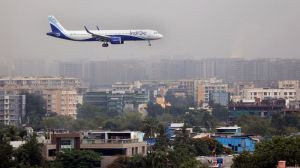Underlining that “stable, predictable, constructive ties between India and China will contribute significantly to regional as well as global peace and prosperity”, Prime Minister Narendra Modi said Tuesday he was looking forward to meeting Chinese President Xi Jinping in Tianjin on the sidelines of the Shanghai Cooperation Organisation leaders’ summit on August 31-September 1.

After visiting Chinese Foreign Minister Wang Yi called on him in New Delhi, Modi, in a post on X, said, “Glad to meet Foreign Minister Wang Yi. Since my meeting with President Xi in Kazan last year, India-China relations have made steady progress guided by respect for each other’s interests and sensitivities. I look forward to our next meeting in Tianjin on the sidelines of the SCO Summit. Stable, predictable, constructive ties between India and China will contribute significantly to regional as well as global peace and prosperity.”
The Prime Minister’s Office said, “Prime Minister emphasised the importance of maintaining peace and tranquillity on the border, and reiterated India’s commitment to a fair, reasonable and mutually acceptable resolution of the boundary question.”
“Prime Minister welcomed the steady and positive progress in bilateral ties since his meeting with President Xi in Kazan last year, guided by mutual respect, mutual interest and mutual sensitivity, including the resumption of the Kailash Manasarovar Yatra,” it said.
At least three new mechanisms or groups on the India-China border issues are being formed.
After Wang met National Security Advisor Ajit Doval, the two sides decided to set up an “Expert Group”, under the Working Mechanism for Consultation and Coordination on India-China Border Affairs (WMCC), to “explore Early Harvest in boundary delimitation” in the India-China border areas, the Ministry of External Affairs said.
Story continues below this ad
They also agreed to set up a Working Group, under the WMCC, to “advance effective border management” in order to maintain peace and tranquillity in the border areas; and create “General Level Mechanisms in Eastern, and Middle Sectors, in addition to the existing General Level Mechanism in Western Sector, and holding an early meeting of the General Level Mechanism in the Western Sector”.
The two sides agreed to use the border management mechanisms at diplomatic and military levels to carry forward the process of “border management, and discuss de-escalation”, beginning with the principles and modalities, the MEA said.
Doval told Wang that the border has been “quiet” and there has been an “upward trend” in bilateral ties.
Recalling that Modi and Xi met in Kazan in Russia last October, Doval said the two leaders were able to set a “new trend”, and “we have profited a lot since then”, and that bilateral engagements have been “substantial”.
Story continues below this ad
According to the MEA, the two sides spoke “positively of the progress made in the implementation of the important leader-level consensus in Kazan. The two sides shared the view that peace and tranquility has been maintained in the India-China border areas since the 23rd SR Talks (Special Representative-level talks). They reiterated the importance of maintaining peace and tranquillity in the border areas to promote overall development of the India-China bilateral relationship”.
“Discussions in the SR talks covered issues related to de-escalation, delimitation and boundary affairs,” it said, adding that both sides agreed to jointly maintain peace and tranquility in the border areas through friendly consultations.
It said that “under the strategic guidance of the leaders of the two countries and in a positive and constructive spirit, the two sides had a candid and in-depth exchange of views on India-China boundary question”, and the two SRs agreed the need to take a “political perspective” of the overall bilateral relationship while seeking a fair, reasonable and mutually acceptable framework for settlement of the boundary question in accordance with the Agreement on Political Parameters and Guiding Principles for Settlement of the India-China Boundary Question signed in 2005. This is in sync with India’s stand that the border situation directly impacts the bilateral ties.
In Wang’s meeting with External Affairs Minister S Jaishankar, the MEA said that the two sides had “positive, constructive and forward-looking” discussions on bilateral, regional and international issues of common interest and agreed on the understandings and outcomes/practical steps on people-centric and economic engagement.
Story continues below this ad
In this context, both sides agreed to “resume direct flight connectivity” between the Chinese mainland and India at the earliest, and finalise an updated Air Services Agreement. They also agreed on the facilitation of visas to tourists, businesses, media and other visitors in both directions.
Both sides agreed to the re-opening of border trade through the three designated trading points, namely Lipulekh Pass, Shipki La Pass and Nathu La Pass, it said.
They also agreed to facilitate trade and investment flows between the two countries through concrete measures.
Sources said China promised to address three key concerns of India. Wang assured Jaishankar that China is addressing India’s needs of fertilisers, rare earths and tunnel boring machines, sources said.
Story continues below this ad
The two sides exchanged views on trans-border rivers cooperation and agreed to give full play to the role of India-China Expert Level Mechanism on Trans-border Rivers and keep communication on renewal of the relevant MoUs. The Chinese side agreed to “share hydrological information during emergency situations based on humanitarian considerations”.
During the discussions, “External Affairs Minister also underlined India’s concerns with regard to the mega dam construction being undertaken by China in the lower reaches of the Yarlung Tsangpo (Brahmaputra river), which will have implications for lower riparian states. The need for utmost transparency in this regard was strongly underlined,” the MEA said.
The Indian side, the MEA said, strongly raised the issue of terrorism in all its forms and manifestations, including cross-border terrorism, recalling that one of the original objectives of the SCO, whose summit will be held later this month in China, was to counter the evil of terrorism. Wang Yi concurred that countering terrorism should be given the highest priority, it said.
They also agreed to support each other in hosting successful diplomatic events – the Chinese side will support India in hosting the 2026 BRICS Summit and the Indian side will support China in hosting the 2027 BRICS Summit.
Story continues below this ad
They also agreed to explore and resume various official bilateral dialogue mechanisms and exchanges, to enhance cooperation and address each other’s concerns and properly manage differences, including holding the Third Meeting of the India-China High-level Mechanism on People-to-People Exchanges in India in 2026.
They also agreed to continue supporting each other in holding events in 2025 to commemorate the 75th anniversary of the establishment of diplomatic relations between India and China.
“Both sides underscored that the strategic guidance of the leaders of India and China plays an irreplaceable and crucial role in the development of India-China relations. They agreed that a stable, cooperative and forward-looking relationship between India and China is in the mutual interest of the two countries to realise their development potential fully. They further agreed that both sides should earnestly implement the important common understandings reached between the two leaders and promote sustained, sound and steady development of India-China relations,” it said.
Given the Trump administration’s recent moves on imposing tariffs, the MEA said that both sides agreed to “uphold multilateralism, enhance communication major international and regional issues, maintain a rules-based multilateral trading system with WTO at its core, and promote a multipolar world, that safeguards the interest of developing countries”.
Story continues below this ad
Doval commended Wang’s “personal efforts” and “the maturity and the sense of responsibility”.
Wang, in his opening statement, said “the setbacks we experienced in the past few years were not in the interests of the people of our two countries”.
“And then in October last year, President Xi Jinping and Prime Minister Modi had a meeting in Kazan. That meeting pointed the direction for the development of our bilateral relations and provided impetus for the proper settlement of the boundary question. We had very good 23rd Special Representative talks at the end of last year. At that meeting, we reached a new and important consensus on the management of disagreements, stable borders and moving toward a settlement.”
“We identified specific goals and formed a working framework,” he said, also adding that “we are heartened to see the stability that is now restored in the borders”.
Story continues below this ad
TAKE SERIES OF STEPS
* Three new mechanisms to manage border
* Agree to discuss de-escalation at LAC
* Facilitate trade and investment flows
* Border trade via designated points
* Resumption of direct flights at earliest
* India flags terror, Brahmaputra concerns









